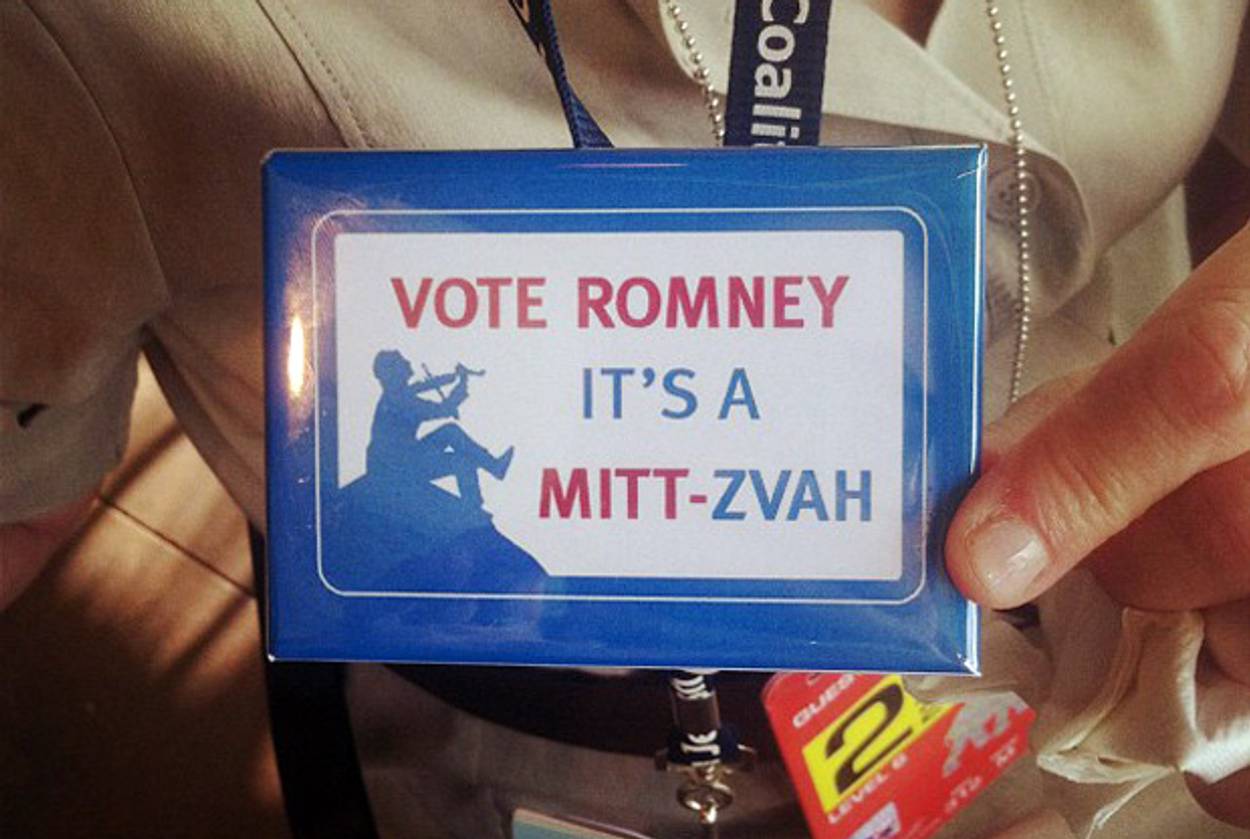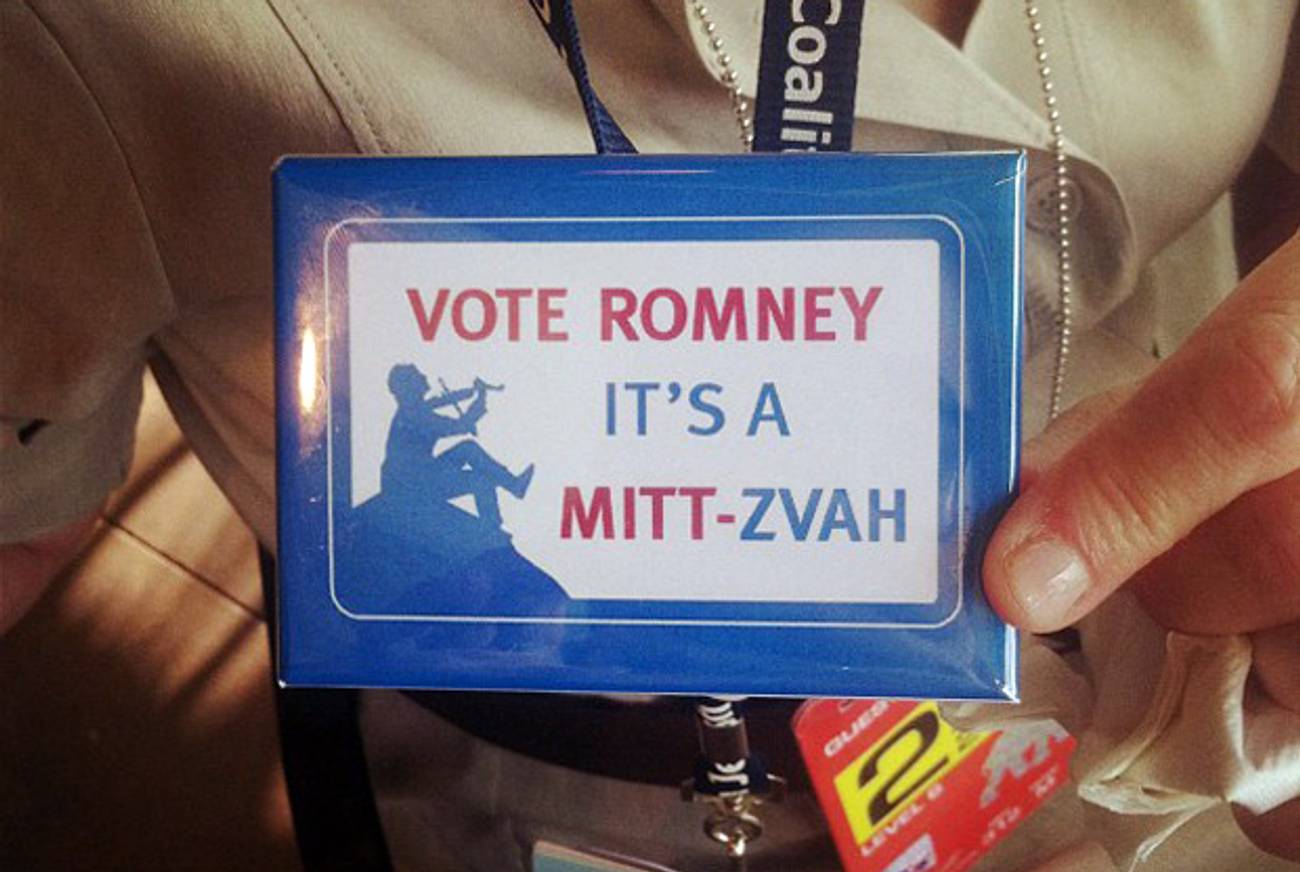Republican Jews Speak Out
For some Jewish conservatives, the RNC is a chance to be vocal about politics they usually keep quiet




For most attendees, the Republican National Convention is all about publicity and access. It’s an opportunity for face time with politicians, photo-ops on the convention floor, and a chance to get interviewed on television. But Margo doesn’t want anyone to know she was even there. And it’s not because she’s a particularly private person—it’s because she’s a Jewish Republican.
“It really is hard to come out of the closet,” she said, echoing a sentiment I heard from many other rank-and-file Jewish conservatives over the past few days in Tampa.
“We joined a Reform Temple in the fall of 2004 in Santa Monica, and the first synagogue newsletter came out just after we had joined,” Margo recalled over lunch before a panel featuring Karl Rove and William Kristol. In it, “the rabbi invited people to come sit shiva on Tuesday morning at 9:30 a.m.—because George Bush had been reelected.
“Fast-forward to the High Holidays services of 2008 and during the sermon—I don’t remember if it was Rosh Hashanah or Yom Kippur—he literally was up there telling us we had to vote for Obama.” For Margo and her family, it was the last straw. “That was the end, we quit.”
Today, Margo remains unaffiliated with a synagogue. “Where are we gonna go? You want to be comfortable. … You want to feel like everybody else doesn’t think you’re evil and stupid and all that just for having different political views.” Margo told me she TiVo’s MSNBC’s Chris Matthews—“even though he’s awful”—because she says she wants to hear the other side. But she feels that her worldview isn’t often granted the same courtesy by her co-religionists.
Other Jewish Republicans I met take a more activist, engaged approach toward the broader Jewish community. Muriel Weber, a member of the Republican Jewish Coalition, explained that “if you’re not going to be at the table, then you can’t influence. If you’re not involved in things, you can’t shape them.”
As an example, Weber pointed to the Jewish Federations of North America’s General Assembly in November 2011, at which Democratic National Committee Chair Debbie Wasserman Schultz delivered the keynote address. “Her speech was basically political,” Weber recalled. “It’s one thing to say that she’s entitled to talk given her position—a Jewish congresswoman—but there was no balance. And there were plenty of high-profile Republicans—both Jewish and not—that they could have brought in to provide that.”
Weber brought this issue to the attention of her local Federation in Ohio, which was somewhat sympathetic to her concerns. “The point is, they have to hear that from somebody. They have to realize that there are other people who think differently. If she’s going to be there telling everyone Obama is our best friend, when obviously not everyone thinks that’s the case, that’s really not appropriate.”
For these gadfly Jews, the Republican National Convention is a welcome respite from the ideological conformity of their home communities—a rare opportunity to hear from prominent Jewish politicians like House Majority Leader Eric Cantor, quote FOX News approvingly, and enjoy the company of the like-minded. “Usually back home in the suburbs of Cleveland, if you’re out for coffee, you talk quietly [about politics],” said Weber. “But here, you’ll be talking and someone just chimes in, and they’re supportive and it’s refreshing.” Not that it’s something she’ll be mentioning back in her Jewish community in Ohio. “There’s this undercurrent that if you believe in this stuff, if you support Mitt Romney, if you’re here [at the RNC], then you must be some sort of moron.”
***
But if some Jewish Republicans feel pressed to attend the RNC off the record, given communal realities at home, others are quite comfortable owning their affiliation–specifically, Orthodox Jews. “It’s not a problem at all,” said Max Levine of his conservative politics in his Modern Orthodox synagogue in Miami. “It’s barely a conversation. Everybody’s on the same page.”
At 33, Levine—a member of the leadership council of the Republican Jewish Coalition—is one of the youngest people in the room at most of the Jewish Republican events, and one of very few Orthodox attendees. When I told him I was looking to interview young Jewish conservatives, he laughed. “All three of us.”
But Levine, a former tax attorney-turned-financial adviser at Merrill Lynch, hopes to increase that count. He’s helping organize Rabbis for Romney—“in the Orthodox community, it’s not that difficult”—and sees Orthodox Jewry as an untapped resource for conservatives. (Right now, Rabbis for Obama has 600 members, up from 400 in 2008.)
Why would a committed Jew support the Republican Party in this election? “There are only two places where a Jew can live as a Jew right now, and that’s America and Israel,” argued Levine. “And without the strength of the economy and Western values in America, both of those have the potential to go away.”
I noted that he didn’t mention Israel policy in making his case. “I don’t demonize Obama on Israel,” Levine explained. “I think he’s made critical mistakes, primarily in perception, not necessarily mistakes in on-the-ground policy. But when he says things like ‘I want to create daylight between the U.S. and Israel,’ I think that’s very naïve and misreads how it’s going to be perceived by the enemies of Israel.
“I’m not a person who thinks that Obama is secretly anti-Israel. But I am a person who believes that Mitt Romney will do a better job handling that relationship than Obama has.” Levine acknowledged that this is a more nuanced view than found in mainstream conservative politics but said that in the Orthodox community, “I do think a lot of people share my view, though not as many as I’d expect.”
But for reasons of both foreign and domestic policy, Levine sees Orthodox Jews moving further and further into the conservative camp. “People don’t realize that while within the Orthodox community obviously issues like school choice resonate on a local level, issues like the Second Amendment also matter to Jewish voters, at least in Florida,” he said. “I don’t think people realize the degree to which the Orthodox community feels at home in the Republican Party.”
***
Like this article? Sign up for ourDaily Digestto get Tablet Magazine’s new content in your inbox each morning.
Yair Rosenberg is a senior writer at Tablet. Subscribe to his newsletter, and follow him on Twitter and Facebook.
Yair Rosenberg is a senior writer at Tablet. Subscribe to his newsletter, listen to his music, and follow him on Twitter and Facebook.